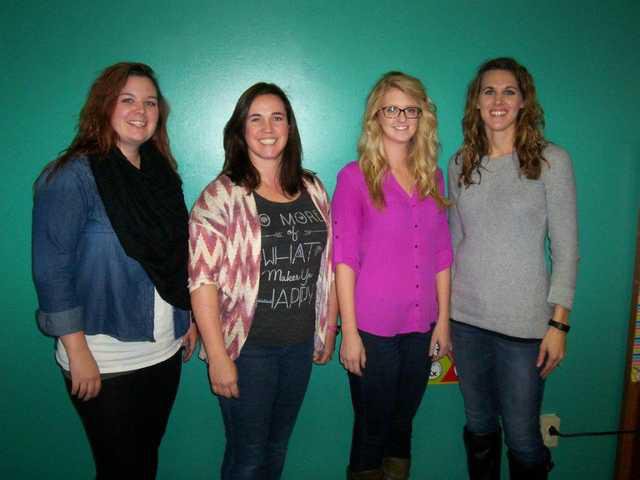EDITOR’S NOTE: This is the first of two stories about the new Autism Team at the Sunflower Diversified Services Early Education Center.
The formation of an Autism Team at the Early Education Center (EEC) promises to be a major building block in support of families with questions about their children’s development, EEC Coordinator Cathy Estes said.
Sunflower Diversified Services owns and operates the EEC, which serves infants and toddlers with developmental disabilities and delays age birth to 3.
Experts from the University of Kansas are training members of the new team, Estes said. They have been here twice so far and are always available to answer questions.
“This is a phenomenal opportunity for us, which means it is a phenomenal opportunity for the families we serve,” Estes said. “The training will be ongoing until we are confident enough to be on our own.
“I can see that confidence building every day as we continue to learn,” she added. “We have a highly educated, compassionate and professional staff that brings expertise to families’ homes on a regular basis.”
Autism is a complex developmental disability that typically starts appearing during the first years of life; however, it often is not diagnosed until after age 3. Autism affects a person’s ability to communicate and interact with others.
It is defined by a certain set of behaviors and is a “spectrum disorder” that affects individuals differently and to varying degrees, Estes said. There is no known cause but research points to a combination of genetic components and environmental factors. It is a biological disorder.
EEC Autism Team members are Heather Quillin, speech-language pathologist; Holly Milligan, physical therapist; and McKinley Phillips and Chelsea Alexander, both early childhood special education teachers.
Quillin noted that families are already seeing results from the EEC’s collaboration with the Technical Assistance Support Network Autism & Tertiary Behavior Supports (TASN-ATBS) team from the KU Medical Center.
“We started our training because we want families to get answers quicker,” Quillin said. “It used to take up to 18 months for an appointment with a developmental pediatrician if autism was suspected. Now it can be a matter of weeks.”
While Quillin stressed that the EEC staff doesn’t diagnose autism, at least eight children have been evaluated. These families may now have quicker access to the developmental pediatrician for further assessment and a possible diagnosis.
Even though the team may be checking for signs of autism “we are also assessing for other early developmental delays,” Quillin noted. “We are not always ruling autism out but may be gathering information that helps the developmental pediatrician identity other concerns.
“We meet the needs of the child no matter what a developmental pediatrician may discover,” she continued. “If development is hindered for whatever reason, we offer our comprehensive early intervention services to families.”
EEC staff members regularly visit family homes and other natural environments such as daycare centers.
“Families know us and are comfortable with us,” Quillin said. “This lessens their burden during an autism assessment and allows time for us to gather information over a period of time.
“And there is a lot of information to gather; it is intense,” she elaborated. “We do an initial screening and interview with parents who are used to us being around. Then the Autism Team will complete additional assessments and offer advice about the next step.”
The birth of the Autism Team began when Coordinator Estes contacted the Kansas Department of Health & Environment. It referred her to the TASN-ATBS.
Comments from Sarah Behrens, TASN-ATBS family services and training coordinator, will be included in the second part of this two-part series. TASN-ATBS is a Kansas Department of Education program working in collaboration with the KU Medical Center.





